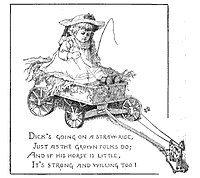
Photo from wikipedia
Previous studies have established that there is a relationship between efficacy beliefs and procrastination. Theory and research on motivation suggest that visual imagery (the capacity to create vivid mental images)… Click to show full abstract
Previous studies have established that there is a relationship between efficacy beliefs and procrastination. Theory and research on motivation suggest that visual imagery (the capacity to create vivid mental images) may be implicated in this relationship and in the general tendency to procrastinate. This study's aim was to build on prior work by examining the role of visual imagery, as well as roles of other specific personal and affective factors, in predicting academic procrastination. Self-efficacy for self regulatory behavior was observed to be the strongest predictor, predicting lower rates of academic procrastination, though this effect was significantly greater for individuals who scored higher on a measure of visual imagery. Visual imagery predicted higher levels of academic procrastination when included in a regression model with other significant factors, though this relationship did not hold for individuals who scored higher on self regulatory self-efficacy, suggesting that this self-belief may shield individuals who would otherwise be disposed to procrastination behavior. Negative affect was observed to predict higher levels of academic procrastination, contrary to a previous finding. This result highlightsthe importance of considering social contextual issues that may influence emotional states, such as those surrounding the Covid-19 epidemic, in studies of procrastination.
Journal Title: Psychological reports
Year Published: 2023
Link to full text (if available)
Share on Social Media: Sign Up to like & get
recommendations!